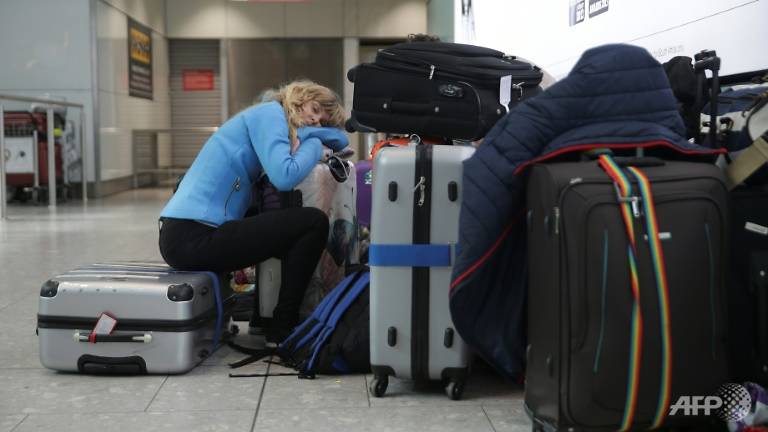British Airways has no excuse for the chaos at Heathrow airport
 |
| A computer systems failure at British Airways caused chaos for thousands of holidaymakers on a busy holiday weekend. (Photo: AFP/Daniel LEAL-OLIVAS) |
LONDON: People can be remarkably tolerant of long travel delays when they are clearly unavoidable, clearly communicated and accompanied by practical efforts to limit the inconvenience and help those affected make alternative plans.
None of these mitigating features was evident at Heathrow or Gatwick airports on Saturday, when a computer system crash forced British Airways to cancel all its flights out of London on one of the busiest weekends of the year.
Instead, thousands of passengers were left stranded without information, many of them unable to retrieve their luggage or even leave the terminal. British Airways staff were conspicuous by their absence.
NO GOOD EXCUSE
When the airline's chief executive, Alex Cruz, eventually donned a yellow jacket to issue an apology posted on Twitter, his message amounted to: "We're really sorry, but please don't come to the airport, and please, please don't try to call customer services."
On Sunday, he offered further apologies, acknowledging many families had endured a "horrible experience", but Heathrow remained crowded and chaotic, with about a third of British Airways flights still cancelled.
On the scant information available so far, there appears to be no good excuse for the crippling IT failure. Mr Cruz said there was no evidence of a cyberattack and that the root cause seemed to be a power supply issue - the same reason given by Delta, the US airline, when IT problems forced it to ground planes around the world last year.
This is an entirely inadequate explanation. Whatever back-up systems British Airways had in place, they are woefully deficient if they cannot withstand a power cut. No chief executive today can afford to underestimate the threat posed by either cyberattack or more mundane IT glitches.
Equally inexcusable, though, was British Airway's failure to look after families left in limbo. Those executives responsible for such errors should be held to account. Mr Cruz must be ruthless with subordinates who dropped the ball, but his own management of the crisis should be equally scrutinised.
British Airways’ GMB trade union was swift to blame the disruption on British Airway's decision to outsource some of its IT functions. Given their natural bias, this claim needs substantiation.
But British Airways has been more aggressive than other legacy airlines in cutting costs to compete with low-cost carriers and new challengers on its long-haul routes. It has irked customers by trimming frills, from the flowers in first-class toilets to economy-class leg room. This incident will prompt questions as to whether it is also scrimping on essentials.
PRIVILEGED POSITION
If so, it will be entirely self-defeating. British Airways has two big advantages over its rivals. One is its brand. There is an enduring perception that the former flag carrier offers higher standards, better customer service and is intrinsically more trustworthy than the low-cost upstarts. This perception will not survive many more such debacles.
British Airways’ other huge asset, though, is its dominant position at Heathrow, a hub for the most lucrative long-haul routes used by business travellers, where it holds more than 50 per cent of take-off and landing slots. This is partly due to astute deal-making: British Airways gained new slots as a result of its parent company IAG's takeovers of British regional airline BMI and Ireland’s flag airline Aer Lingus.
But it is largely a legacy of its days as a flag carrier: British Airways has "grandfathered" rights to its existing slots and can keep them so long as it uses them. Although slot trading is allowed, the severe capacity constraints at Heathrow mean that very few new slots are made available.
Under the current regulatory regime, this makes British Airways’ advantage a formidable one. It is increasingly questionable whether the airline deserves its privileged position.
What the stars mean:
★ Poor ★ ★ Promising ★★★ Good ★★★★ Very good ★★★★★ Exceptional
Latest News
More News
- 72 nations sign landmark Hanoi cybercrime convention (October 26, 2025 | 18:00)
- UN Secretary-General commends Vietnam’s global leadership (October 26, 2025 | 09:00)
- APEC finance ministers convene to tackle regional challenges (October 22, 2025 | 17:31)
- Rewiring global trade: ASEAN’s rise as supply chain hub (October 17, 2025 | 11:40)
- Vietnam attends first World Nuclear Week Forum in Russia (September 26, 2025 | 10:50)
- Vietnam attends 69th session of IAEA General Conference (September 16, 2025 | 10:00)
- ADB, WB pledge over 12 billion USD for ASEAN power grid, renewable energy projects (August 15, 2025 | 14:18)
- Lowy Institute proposes AI-based tobacco control solutions for ASEAN (August 15, 2025 | 14:14)
- Cloud computing policy to position Malaysia as regional hub by 2030 (August 15, 2025 | 14:11)
- Thailand, Cambodia suffer numerous cyber attacks (August 05, 2025 | 16:19)


















 Mobile Version
Mobile Version